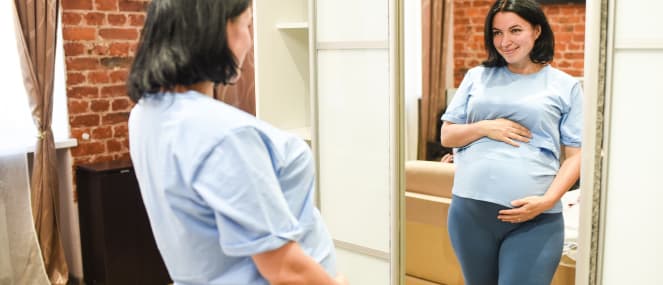
- Health hub/
- Resources for Pregnancy and Preconception/
- How Fertility Changes with Age


How does age impact fertility?
Age is the most important factor affecting fertility for both men and women. Whether through natural or assisted reproductive methods, fertility decreases as age increases, although this can vary for everyone. This is why we do see people who have babies in their later years, but in the majority of cases, it is more difficult to conceive with older age, especially after the age of 35.
According to Your Fertility, an Australian national public health promotion program, the combination of both partners' ages determines the likelihood of pregnancy because age affects sperm and eggs.
For example, for a woman aged 29 who has a partner aged 40, her chances of conceiving may be lower than if her partner was aged 33. The risk of complications also increases with an older male partner.
Other factors can impact fertility; however, age is the biggest one.
What is the Impact of Age on Women’s Fertility
Women's peak fertility is generally in their 20s, and it starts to decline in their late 20s and early 30s. The rate of decline becomes more rapid in their late 30s. According to Your Fertility, it can also take longer to conceive. They also report that women younger than 30 have about a 20 per cent chance of getting pregnant naturally each month. This decreases to about five per cent each month by age 40.
Egg quality and quantity
At birth, women have a finite number of reproductive cells called eggs. This number peaks at around 20 weeks of gestation and subsequently decreases consistently until a woman is approximately age 32. The number of eggs then decreases at a greater rate and even more rapidly from age 37.
As the British Fertility Society reports, most girls have about 2 million eggs at birth, about 25,000 at age 37, and about 1000 immature eggs by age 51, when women have their menopause, but these are not fertile.
The quality of the egg is also important for successful fertility.
As age increases, the chances of chromosomal abnormalities in eggs increase, which negatively affects egg quality, reduces the chance of pregnancy and increases the risk of pregnancy and birth complications. Your Fertility reports that at age 40, about 75% of eggs are chromosomally abnormal.
If you have been having trouble conceiving for over six months, your healthcare provider may conduct a fertility evaluation and test for the amount of eggs you have
What is the Impact of Age on Men’s Fertility
For men, the chance of having a child is higher for men under the age of 40Decreased sperm count
Your Fertility describes how the quality of sperm men produce seems to decline as they age.
"Most men make millions of new sperm every day, but men older than 40 have fewer healthy sperm than younger men. The amount of semen (the fluid that contains sperm) and sperm motility (ability to move towards an egg) decrease continually between the ages of 20 and 80."
Lifestyle changes to support fertility
Ways to optimise fertility include maintaining a healthy weight, as carrying extra weight can cause problems with hormone levels, according to Your Fertility, which can affect the menstrual cycle and the quality of a woman's eggs and a man's sperm.
Maintaining a healthy lifestyle, including smoking cessation, reducing alcohol intake, avoiding recreational drugs, and maintaining a nutritious diet, can also support fertility.
Some health conditions can impact fertility, so discuss these with your GP and how to manage them if you have any of them.
You could try to have sex during the ideal 'fertile window', which Your Fertility notes as
the day of ovulation and the five days before that. "A woman's most fertile time is during the three days leading up to and including ovulation."
Using lubricants that are labelled 'fertility friendly ‘because some can affect the sperm's quality.
Avoid endocrine-disrupting chemicals (EDCs) that have been studied to suggest that they may negatively impact female fertility. The most common ones in everyday items such as plastic include bisphenols (BPA), parabens, and phthalates.
Seek support in the Conception Stage
It's also important to remember that conceiving can be difficult, regardless of age, whether due to other reasons or a combination of age and other factors. Those thinking about conceiving or have been trying and having difficulty can see a local GP, family planning clinic or obstetrician to discuss fertility, including your situation and a potential plan.
Conclusion
Understanding that age plays a critical role in fertility and the chances of conceiving means that you can prepare and plan for your goals and have reasonable expectations for getting pregnant. While you cannot control your age, there are also steps you can take with your lifestyle to optimise your fertility.




